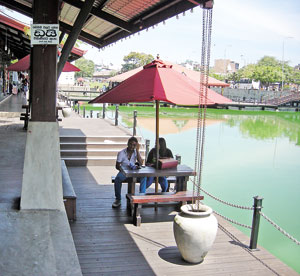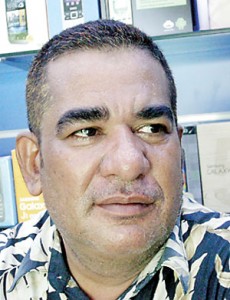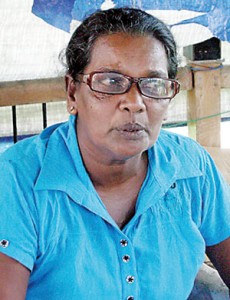News
The Floating Market has sunk, vendors and UDA agree

Floating Market: Where have all the traders and visitors gone? Pix by Athula Devapriya
Many of the nearly 100 stalls in Colombo’s Floating Market were closed while sellers at others seemed to be asleep, with no customers to be seen as we visited the site.
It appears clear that, as a little business hub and tourist attraction, the Floating Market had failed and that those who had invested in opening stalls at the market, had suffered.
The Urban Development Authority (UDA) now acknowledges the failure and says it is attempting to grant some redress to the stallholders – but this leaves the authority with the huge debt incurred in building the market.
A rental for a single floating stall is about Rs. 18,000 per month which is divided among four traders per boat.
Each trader has to pay Rs. 4,500 in rent out of total monthly income, but vendors generally earn much less than they had done at the Manning Market and their previous pavement stalls on Bastian Road, where redevelopment had forced their departure.
T. Kalyani, 49, an achcharu vendor, said what was needed most was a bridge between the Floating Market and the main road to bring in customers, and a solution that takes away the odour of the Beira Lake, where boats with stalls are moored.
“The number of customers who come to the Floating Market compared to other places is very low, and with the stink our business has fallen drastically,” she said.
“If a bridge is opened, visitors will be able to come to the stalls. The current situation is that visitors have to go around the street to come to the floating stalls”, Ms. Kalyani said.
Another seller, 55-year-old K. Rani who comes from Kolonnawa and manages a fruit stall at the market, said she had stopped paying her monthly rent to the UDA.
“We were evicted from where we were in Bastian Road and our shops were demolished.
Then we were asked to pay an advance of Rs. 6,000 and a monthly rent of Rs 4,500 for one of the boats to be used as a stall for our business.
“I hardly earn Rs. 300 a day now – how can I pay Rs. 4,500 as rent?” she asked. “I used to earn at least Rs. 2,000 a day while I was running my business on Bastian Road.
“They should at least assist us in some way now that they have moved us here for this failing project of theirs.”
A very different view came from Mohammed Nazaar, 60, who sells electronic goods at the Floating Market.

 “We were given a very nice and valuable place to continue our business activities so it is up to us to maintain our business,” Mr. Nazaar said. “I pay Rs. 12,000 in rent. To be frank, I don’t have any problems with running my electronics business.”
“We were given a very nice and valuable place to continue our business activities so it is up to us to maintain our business,” Mr. Nazaar said. “I pay Rs. 12,000 in rent. To be frank, I don’t have any problems with running my electronics business.”
He said, however, that the previous government, which set up the Floating Market, had not given enough thought to the convenience of the people when they implemented plans to beautify Colombo.

Mohammed Nazaar
“They should have placed the shops on Bastian Road on the approach to the bus stand because many people won’t come inside the market to do their shopping because they are rushing home after work,” Mr. Nazaar said.
Toy-seller T.D. Prasad says the boats have no doors and cannot be locked and so he has little choice but to spend each night in the open boat as packing up all his toys, transporting them home in the evenings and bringing them back each morning was too costly and impractical.
“The income is very low. On a daily basis we earn about Rs. 400-500,” he said. “On the day this market was declared open there was a good turnout as it was something new and people wanted to see what it was all about. Now it is on the decline,” Mr. Prasad said.
“The Floating Market, as it is, cannot be continued,” UDA Chairman Ranjith Fernando acknowledged.
“We will have to look into what can be done to rectify the situation. Plans are underway to relocate the vendors in another place where they can do their business well. We have planned to build some stalls to assist in the relocation.”
He said bringing down the rent was impractical as the UDA had to recover the cost of building the Floating Market. The total cost of building the Floating Market, including repairing the drainage system in the area, was about Rs 1 billion, he said.
President of the Floating Market Traders’ Association, H.M.P. Silva said the association had asked the UDA to move the vendors back to Bastian Road.
“The future of the Floating Market is in the government’s hands,” he said.
| Beira Lake algae ‘will worsen’Rising temperatures will cause a significant increase in algal blooms in the Beira Lake, Colombo University geography professor Dr. Ranjan Piyadasa said. The blue-green algae will cause a lack of oxygen in the lake, causing fish to die. “Algal blooms flourish in warmer waters. There will be a 20 per cent boost in lake algae over the next century, including a 5 per cent increase in blooms that are toxic to fish and animals,” Dr. Piyadasa said. Central Environment Authority Director-General K.H. Muthukudaarchchi, however, said the algal blooms were a natural phenomenon “and we don’t have any strong opinion about this.” |

T. Kalyani

